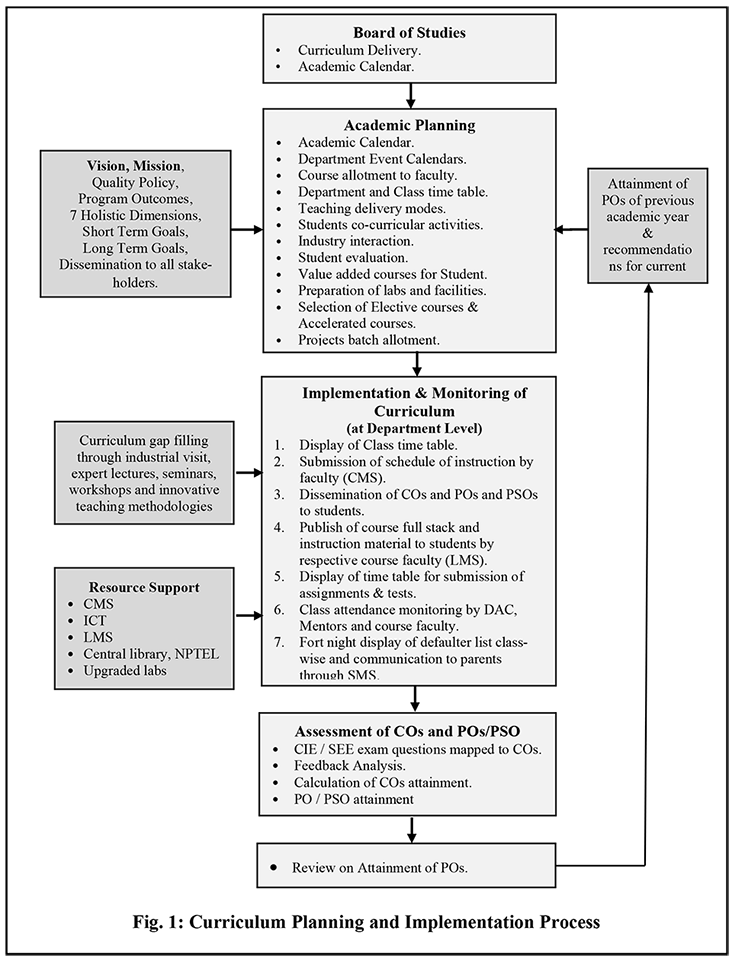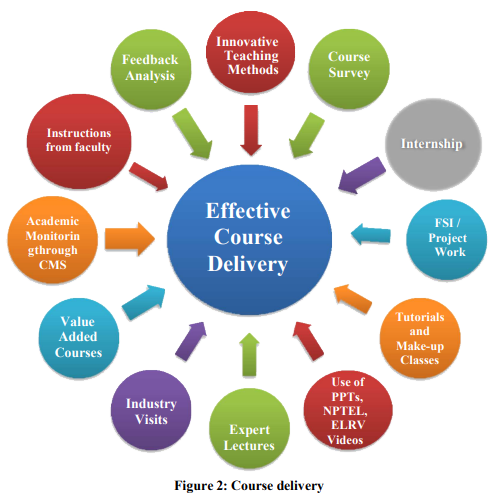The implementation of curricular is carried through a systematic procedure as explains in detail:
The syllabus prepared by BOS, specifies the number of lectures, list of recommended books and assessment scheme of internal and external marks. HOD distributes the teaching load by considering the course choice form filled by the faculty members. In order to have smooth conduct of curriculum, HOD allocates the load according to faculty competency. The activity is carried out immediately after the end of the previous semester so that faculty members get sufficient time for the preparation of the course assigned to them for the next semester.
Every faculty member prepares a schedule of instruction of entire semester in-line with the department’s academic calendar. To prepare and maintain documentation, the institute provides the facility of CMS portal. Detailed module-wise and date-wise plan is prepared by individual faculty.
Schedule of AAT evaluations, CIA and SEE examinations are displayed time to time. Training on OBE, induction, guidance is imparted to newly joined faculty for building and maintaining academic culture in the institute by center for educational technologies (CLET). An induction programme is conducted for First Year Engineering students before start of semester. Imparting guidelines for upgrading innovative and creative teaching learning process, methodology, tools and techniques at periodic intervals by implementing advanced concept of pedagogy, ICT, e/Early learning videos and course full stack through learning management system, student centric AAT methods, participative learning etc. for enhancing teaching and learning experience. Figure 1 shows the process of effective curriculum planning, monitoring and implementation.

The effective implementation of curriculum is ensured by supplementing classroom teaching with expert lectures, presentations / seminars, open ended experiments, in-house and industry supported projects, tutorials, group assignments, case studies, industry visits, industrial training, internships, IARE LMS e-learning/Early Learning Videos (ELRV), NPTEL lectures, tech talk topics, concept video presentations, technical quiz, assignments, internal-tests etc. as shown below.
Training needs of faculty are identified by the head of the department. Faculty is encouraged to attend short term training programs (STTPs), faculty development programs (FDPs), Seminars, Workshops, Industry Training etc. to bridge the need.
Contents beyond curriculum are identified and taught both in the classroom and in the laboratory to expose student learning to recent trends in the industry. Figure 2 shows the course delivery process

Academic coordinator, HOD and Dean of Planning, Monitoring and Continuous Studies, monitors the progress of syllabus coverage every fortnight through CMS portal. The number of lectures planned and the number of lectures actually conducted facilitates identification of gaps, if any, and necessary corrective actions are taken for filling the gap.
Following activities related to academic monitoring are carried out through CMS:
The students are tracked during their academic journey in the institute and special efforts are made to bring slow learners (students with certain limitations) to come at par with the average / above average category. Students with good background and skills are guided to higher levels of achievements and encouraged towards challenging goals (skill-up and skill-bridge).
The entry level student data is shared with the dean of student affairs and Mentors (15 students to mentor), to evaluate the student learning level as advanced learner or slow learner. The mentors, in weekly meetings with all faculties of respective classes, carry out discussion based on analysis records available about students’ levels, abilities, characteristics, skills, attitudes, examination results (internal and external) and their current day to day interactions / experiences. Based on this evaluation, feedback is given to students and special programs / activities are undertaken.
This data analysis done at entry stage is passed subsequently to Mentors of next classes. The mentors of second year onwards carry forward the activities at individual departments. Students’ attendance is also being monitored through CMS portal on every week and list of defaulter students are displayed on department notice board. Attendance of students is regularly being informed to the parents through SMS facility. The career development center make special provision of exhaustive soft skill training and exclusive counselling, to mould the slow and advanced learners to plan their careers and placements. Through this process slow learner are identified and following activities are carried out for them.
Activities for Slow learners:
In order to promote advanced teaching and learning methodologies to give motivation to learn, higher retention of knowledge through better understanding, increasing depth of knowledge and developing positive attitude to the subject taught, the following activities to be planned.
Students’ feedback about teaching a course is taken twice in semester through CMS portal. Early semester feedback is to take between first 15 to 20 days of commencement of classwork. Corrective action is to take after this feedback. Outcome Based (OBE) course questionary is taken on the attainment of Course Outcomes at the end of the semester. Following questionnaire is set for feedback.
Internal assessment is carried out through CIE-1, CIE-2, Alternative Assessment Tool (AAT), Make-up and remedial tests etc. Semester End Examination (SEE) is conducted as per schedule prescribed in academic calendar and termed as external assessment. The AAT may include tech talk, tutorial hours/classes, seminars, assignments, term paper, open ended experiments, concept videos, partial reproduction of research work, oral presentation of research work, developing a generic tool-box for problem solving, report based on participation in create-a-thon, make-a-thon, code-a-thon, hack-a-thon conducted by reputed organizations / any other. etc. Semester End Examination and Continuous Internal Examination questions are used for mapping of CO - PO / PSO.
Assessment Tools
Each course has defined COs that are mapped to the PO’s. The POs are achieved through a curriculum that offers a number of core courses as well as elective courses. A set of performance criteria is used to provide quantitative measure of how well the COs are achieved. The mapping of COs with POs / PSOs of the program are considered by the individual staff and feedbacks from stake holders such as, students, alumni, parents, employers, teachers to give input in framing the syllabus which will be communicated to Board of Studies (BOS) members to modify in the syllabus through faculty participating in various syllabus design and implementation work-shops and separately through E-mail. The suggestions given by individual staff are incorporated by BOS for curriculum enrichment.